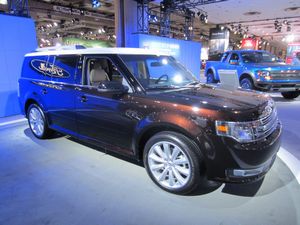















Ford Flex |
|---|
|
| Topic Navigation |
|---|
|
Wikipedia: Ford Flex
Page Sections History Bibliography Photographs Article Index Documents |
History
The following section is an excerpt from Wikipedia's Ford Flex page on 29 April 2017, text available via the Creative Commons Attribution-ShareAlike 3.0 Unported License.
The Ford Flex is a full-size crossover utility vehicle manufactured by the Ford Motor Company since the 2009 model year. The Flex supersedes the Ford Taurus X and Freestyle, sharing their drivetrains and using an updated platform.
The Flex is manufactured alongside the Ford Edge and Lincoln MKX mid-size CUVs at the Oakville Assembly plant in Oakville, Ontario, where the first Flex manufactured at the beginning of June 2008.
The Flex is directly related to a group of rebadged variants, Ford's Chicago D4's, so called for the plant where they were manufactured (Oakville Assembly) and the platform (D4) they share: the Ford Explorer and Lincoln MKT. The Flex is closely related to Ford's Chicago D3's: the Mercury Montego and third generation Mercury Sable sedans; the Ford Freestyle and Taurus X wagons, marketed as a crossover vehicles; as well as the fifth and sixth generations Ford Taurus and Lincoln MKS.
Noted for styling by Peter Horbury that recalls the MINI, and a series of horizontal grooves in its doors and tailgate evoking a Woodie, the Flex is marketed in the United States, in Canada and in the Middle East.
The Ford Flex was first unveiled at the 2007 New York International Auto Show It was introduced as Ford sought to introduce a 7-passenger family vehicle without it being a minivan, a segment in decline since the late 1990s.
At the 2005 Chicago Auto Show, Ford showed the Ford Fairlane concept vehicle. Based on the Ford CD3 platform, it was a 3-row people-mover with distinctive styling. The rear passenger doors of the Fairlane were rear-hinged; although this allowed better interior views for auto-show viewers, this configuration also previewed the sliding doors of a minivan.
In the change to a production vehicle, the Fairlane would change names to Flex and shift platforms to the larger D3/D4 architecture. A notable change from the concept was the adoption of 4 conventionally hinged doors, as Ford chose to market it more as a wagon-type crossover. Several key styling features of the Fairlane concept would make their way into the production Flex, however. The most distinctive is a series of horizontal grooves in the doors, intended to evoke a Woodie look without using simulated wood. Car Design News said the styling references "a previous era without resorting to obvious retro styling cues." Additionally, these help to visually lower the vehicle. In a design similar to the Mini and the Range Rover, the roof pillars are blacked out, creating a "floating roof" effect.
The Flex is based on the Ford D4 platform, a version of the Volvo-derived Ford D3 platform that is re-engineered for use in crossover sport-utility vehicles. The chassis shares its underpinnings with the 2005-2007 Ford Freestyle, 2008-2009 Ford Taurus X, and the 2011-present Ford Explorer. While front-wheel drive is standard, all-wheel drive is available as an option. The Flex includes an independent rear suspension system and a traction control system called AdvanceTrac.
For the 2013 model year, the Ford Flex was given a major body update. The 2013 Flex made its world debut at the 2011 LA Auto Show. While the roofline and doors were retained, the front and rear saw major changes. A single-bar grille replaced the three-bar grille, but other changes to the front end attracted even more attention. Along with the SVT Raptor, the Flex was a model that did not wear the Ford blue oval emblem; the hood wore "F-L-E-X" above the grille. On the tailgate, the Ford emblem was decreased in size and moved to the bottom right corner. Inside, the dashboard was updated, with a new 3-spoke steering wheel.
In November 2016, the Canadian auto workers union Unifor claimed that as part of their agreement, Ford intends to end production of the Flex in 2020. Ford has not yet confirmed this.
| Title & Subtitle | Details |
|---|---|
2012 Flex Wiring Diagrams | Year & Type: 2012 Service Manual Publisher: Ford Motor Company Dimensions: 11" x 8.5" softcover Content: 300+ pages w/black & white illustrations Topic: Ford Flex Availability: Reference Desk |
 |
2012 2012 New York International Auto Show Photo courtesy BlueSpringsFordParts.com View photo of 2012 Ford Flex - 302KB |
 |
Too Cute Consignment Photo ©2017 Bill Crittenden View photo of Too Cute Consignment Ford Flex - 3.2MB |
 |
Too Cute Consignment Photo ©2017 Bill Crittenden View photo of Too Cute Consignment Ford Flex - 3.2MB |
 |
Too Cute Consignment Photo ©2017 Bill Crittenden View photo of Too Cute Consignment Ford Flex - 3.1MB |
| Date | Article | Author/Source |
|---|---|---|
| 12 April 2007 | Ford Bares Flex Crossover’s Particulars | Anthony Fontanelle |
| 27 March 2015 | 2013 Ford Flex SE  | Bill Crittenden |
| Date | Document Name & Details | Documents |
|---|---|---|
| 30 April 2009 | Safety Compliance Testing for FMVSS 201: Occupant Protection in Interior Impact, Upper Interior Head Impact Protection 2009 Ford Flex National Highway Traffic Safety Administration | PDF - 4.7MB - 169 pages |
| 17 June 2009 | Safety Compliance Testing for FMVSS 201: Rigid Pole Side Impact Test 2009 Ford Flex SE FWD National Highway Traffic Safety Administration | PDF - 6.9MB - 143 pages |
| 17 August 2009 | Safety Compliance Testing for FMVSS 202a: "Head Restraints" 2009 Ford Flex National Highway Traffic Safety Administration | PDF - 2.6MB - 73 pages |
| 29 January 2010 | Vehicle Safety Compliance Testing for FMVSS 208, Occupant Crash Protection; FMVSS 212, Windshield Mounting; FMVSS 219, Windshield Intrustion (Partial); FMVSS 301, Fuel System Integrity 2009 Ford Flex MPV National Highway Traffic Safety Administration | PDF - 26.4MB - 321 pages |
| 25 May 2010 | Safety Compliance Testing for FMVSS 214: Dynamic Side Impact Protection (Moving Deformable Barrier) 2010 Ford Flex SE 4-Door Wagon National Highway Traffic Safety Administration | PDF - 6.4MB - 335 pages |
